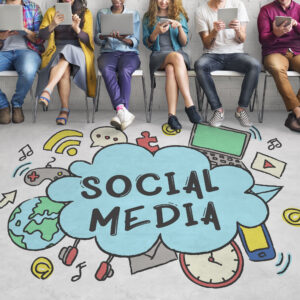Right now, if I were to ask you, the reader, to open up your phone and look at your data usage, would you be surprised by what you saw? As of 2022, the average daily social media usage of internet users worldwide amounted to 151 minutes per day, up from 147 minutes in the previous year (Statista).
We live in a digital age where we have unfettered access to a World Wide Web of information. The internet isn’t going away, so how can we learn to live with it in a way that doesn’t allow it to become too centered in our lives?
Which Social Media Platforms are the Most Popular Among Teens Today?
As far as apps on their mobile devices, it appears that teens are mostly using social media or social networking apps, with YouTube being the most widely used. 81% of users said YouTube is their most commonly used app, followed by Facebook at 69%, Instagram at 40%, and apps like Snapchat, TikTok, WhatsApp, and Twitter all at around 20 to 30% (Pew Research Center).
Clearly, we can’t seem to look away! Why is that?
Why do Teens use Social Media?
According to the Pew Research Center, the majority of teens credit social media with strengthening their friendships and providing support while also noting the emotionally charged side of these platforms.
- Eight in ten teens say that what they see on social media makes them feel more connected to what’s going on in their friends’ lives.
- 71% say it makes them feel like they have a place where they can show their creative side.
- 67% say these platforms make them feel as if they have people who can support them through tough times.
- A smaller share – though still a majority – says the same for feeling more accepted.
- These positive sentiments are expressed by teens across demographic groups.
Ultimately, teens are using social media because it does have positive impacts, including helping them feel more connected to others, sparking creativity and expression, and strengthening relationships.
How does Social Media Impact Teens?
When asked about the overall impact of social media on them personally, more teens say its effect has been mostly positive (32%) than say it has been mostly negative (9%), and 59% believe social media has had neither a positive nor a negative effect on them (Pew Research Center).
One teen states: “Social media has definitely had some negative influence on me, but overall, it has been an overwhelmingly positive effect. It allows me to connect with my friends in ways that would otherwise be impossible and has introduced me to many of my favorite books, movies, and games. I’ve also learned a lot from some platforms, like YouTube, which can be used for educational purposes too.” (Pew Research Center)
While these youth describe some of the benefits they get from social media, this positivity is not unanimous.
- 38% of teens say they feel overwhelmed by all the drama they see on social media.
- About 31% say these platforms have made them feel like their friends are leaving them out of things.
- 29% have felt pressure to post content that will get lots of likes or comments.
- 23% say these platforms make them feel worse about their own life.
Teens believe their parents have a very different view of social media and how it affects them.
- 22% believe their parents are extremely or very worried about them using social media.
- 27% say their parents are somewhat worried.
- 41% say their parents are worried only a little or not at all.
- 9% say they aren’t sure about the level of concern their parents have over their social media use.
With parents and teens feeling so different about the effects of social media and internet use, how can we come together and talk more openly about those worries and fears?
It all starts with open conversations with both parents and kids about what apps they are using and what sorts of content they are exposed to when online.
It is important for parents to be curious about what their kids are consuming online. Leaning in with curiosity will greatly increase your kids’ chances of being open and honest with you. The more safe you make it for your kids to talk to you about their internet use, the more likely they will come to you if they end up somewhere online that makes them uncomfortable.
Generation Alpha (those born in 2010 and later) are growing up with the internet and access to information at their fingertips, and we need to help them learn how to navigate it so that it stays a healthy, safe place for them as they age.
What are the Benefits of Social Media for Teenagers?
Community! We all need it, and for some folks, their virtual lives give them that space to find the community that best fits them. It can be an amazing way for people around the world to get connected and make friends.
During the pandemic, our worlds turned online as a way to connect and feel so alone. This opening up of our world has been amazing for creating a more global connection and community. Many of the teens I meet with have friends from all over the country, if not all over the world. Finding connections and making friends can be the catalyst that some folks need in order to start to feel better.
What are the Risks of Social Media for Teenagers?
Let’s be real – the internet isn’t always sunshine and rainbows. It has also created spaces for folks to gather to connect in ways that have led to violence and increased oppression. The internet and social media have contributed to political polarization and cyber bullying.
Nearly half of U.S. teens ages 13 to 17 (46%) report ever experiencing at least one of six cyberbullying behaviors asked about in a Pew Research Center survey conducted April 14 – May 4, 2022:
- Offensive name-calling
- Spreading of false rumors about them
- Receiving explicit images, they didn’t ask for
- Physical threats
- Constantly being asked where they are, what they’re doing, or who they’re with by someone other than a parent
- Having explicit images of them shared without their consent
(Pew Research Center)
For more information about what to do if you suspect your child is being bullied, see our blog “My Kid Is Getting Bullied”.
Healthy Social Media Use and How to Make Changes if Needed:
With that all being said, how do we make sure us and our teens are safe and healthy in this digital world?
Check in with yourself. If you or your teen are spending time online and it is making you feel bad, negative, scared, or uncomfortable, that is a sign that you are not on pages, apps, or sites that may not be good or healthy.
What does it mean to check in with yourself? Well, so often, we ignore the cues that our bodies give us when we are experiencing something that is not great. Often our bodies are our first line of defense and our first signals to danger or telling us that something isn’t right.
Some cues to look for while you are online that indicate you might need to set some boundaries online or make some changes to your social media habits:
- Heart racing
- Sweating
- Increased anxiety
- Upset stomach
- Negative thoughts
- Feeling bad about yourself
These cues are your body’s way of telling you this place is not okay. It means your apps, your posts, or your overall online interactions are causing you distress. Remind your teen of this and have them notice what feelings come up for them while they are engaging with social media.
For more ideas about setting screen time plans and expectations with kids and teens, see our blog “Parent Guide for Screen Time”.
Decide what works for YOU!
When it comes to finding connection and community online, you get to decide what it looks like for you. The algorithm doesn’t have to completely dictate what pages you get to look like or seek out. If you are receiving content on your social media pages that is making you not feel great, it might be time to unfriend and unfollow or move on.
Most importantly of all, it is ok to unfriend/ unfollow/ unsubscribe from things if they are impacting you in a negative way. Your social media pages are yours and no one else’s, so you can set whatever rules you want and get rid of anyone who doesn’t like it.
Not everything online is bad, horrible, or false, and in fact there is a lot of really great data and useful information out there. The internet and social media are connecting us globally, creating communities from marginalized populations, and overall creating really great conversations about our planet and the future.
Since it’s not going away and no one wants to give up their phones the best thing to do is figure out how to use it for you and get what you need out of it. It’s up to you and yours and no one can tell you otherwise.
So, What Apps are Teens Using?
Listed below are some popular apps among teens: 
- X – Formerly known as Twitter
- Pinterest – Image-sharing service where items are posted on pinboards.
- Snapchat – Instant messaging where pictures and messages are usually only available for a short time before they become inaccessible to their recipients.
- YouTube – Online video-sharing platform.
- Reddit – Social news aggregation, content rating, and discussion website. Registered users submit content to the site such as links, text posts, images, and videos, which are then voted up or down by other members.
- WhatsApp – Encrypted app that allows people to text and make phone calls. Can be used internationally.
- TikTok – Video-sharing platform.
- BeReal – Prompts app users to share a photo of themselves and their immediate surroundings given a randomly selected two-minute window every day.
- Instagram – Photo and video-sharing social networking service.
- Facebook – Photo and video-sharing social networking service.
- Tumblr – Microblogging and social networking website.
- Bigo Live – Streaming site where other users can see and comment on the footage. Can contain mature content.
- Grindr – Dating app for casual hookups.
- Blendr – Dating app similar to grinder that is often used to find hookups.
- Holla – Video streaming platform where users can have live video chats with strangers across the world.
Apps that Have Gained Popularity in 2023:
- weCall – FaceTime Meets BeReal.
- REALITY-Avatar Live – Virtual community where users live stream their avatar and talk to friends.
- Yubo – Social platform for making new friends all over the world that is geared to youth. Has a history of being called Tinder for teens.
- Locket – Lets users send pictures straight to the home screen to up to 5 friends.
- Amino – Home to many communities dedicated to everything from K-Pop to skateboarding to Anime. Designed for teens ages 13 and up.
- F3 – Social discovery app to make new friends and communicate with existing ones.
- Made With Friends(MW/F) – User profiles are made by friends who answer questions about them, tag them in prompts, or take photos and videos of them.
- Lemon8 – Similar to Instagram but used among teens and those who love cosmetics, travel, etc.
- PearPop – Users bid for shared screen time with vetted and verified.
Doing research and being selective about apps is one way to have our screen time feel good and energizing, rather than overwhelming and draining. With intentionality, apps and social media can be a tool for staying connected to people and resources, finding inspiration, or even just having a good laugh. Good luck, parents, as you navigate the world of screen time and social media with your kids!
This blog was written by Sentier therapist Ashley Groshek, LMFT, and Sentier’s Client Care Coordinator Ellie Struewing, BA.











